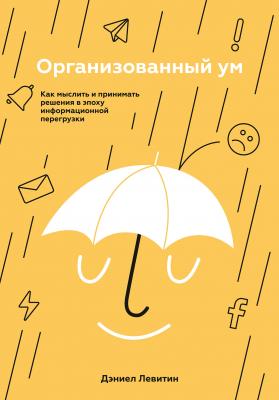Организованный ум. Дэниел Левитин
Читать онлайн.| Название | Организованный ум |
|---|---|
| Автор произведения | Дэниел Левитин |
| Жанр | Самосовершенствование |
| Серия | |
| Издательство | Самосовершенствование |
| Год выпуска | 2014 |
| isbn | 978-5-00146-002-2 |
Lucky, R. (1989), Silicon dreams: Information, man, and machine, New York, NY: St. Martin’s Press.
Rajman, M., & Pallota, V. (2007), Speech and language engineering (Computer and Communication Sciences), Lausanne, Switzerland: EPFL Press.
27
Csikszentmihalyi, M. (2007, May). Music and optimal experience. In G. Turow(Chair), Music, rhythm and the brain. Symposium conducted at the meeting of The Stanford Institute for Creativity and the Arts, Center for Arts, Science and Technology, Stanford, CA.
Неудивительно, что мы так высоко ценим музыку. Музыка – редкий пример проявления нашей способности слышать одновременно более чем двух людей (а именно их игру или пение). Это стало возможным благодаря тому, что музыке присуща гармония; кроме того, люди научились музицировать совместно таким образом, чтобы слушатели могли воспринимать все многообразие звуков исполняемого произведения.
28
Dennett, D. C. (2009). The cultural evolution of words and other thinking tools, публикация в Cold Spring Harbor Symposia on Quantitative Biology 74, 435–441.
MacCready P. (1999). An ambivalent Luddite at a technological feast. По данным сайта http://www.designfax.net/archives/0899/899trl_2.asp
29
Mack, A., & Rock, I. (1998). Inattentional blindness. Cambridge. MA: TheMIT Press.
30
Chabris, C. F. & Simons, D. J. (2011). The invisible gorilla: And other waysour intuitions deceive us. New York: Penguin Random House.
31
Blair, A. M. (2010), Too much to know: Managing scholarly information beforethe modern age. New Haven, CT: Yale University Press.
32
Прямая цитата из Rosch, E. (1978). Principles of categorization в книге E. Rosch & B. B. Lloyd (Eds.) Cognition and categorization (p. 27–48), Hillsdale, NJ: Lawrence Erlbaum Associates.
33
Прямая цитата из Bryson, B. (2010). At home: A short history of private life,New York, NY: Doubleday, p. 34.
34
Почти прямая цитата из Wright, A. (2008), Glut: Mastering informationthrough the ages. Ithaca, NY: Cornell University Press, p. 49.
35
Childe, V. G. (1951). Man makes himself. New York, NY: New American Library.
36
Прямая цитата из Wright, A. (2008), Glut: Mastering information throughthe ages, Ithaca, NY: Cornell University Press, p. 49.
37
Прямая цитата из Bryson, B. (2010), At home: A short history of private life.New York, NY: Doubleday, p. 34.
38
Wright, A. (2008), Glut: Mastering information through the ages. Ithaca, NY: Cornell University Press, p. 6.
39
Postman, N. (1993), Technopoly: The surrender of culture to technology, NewYork, NY: Vintage, p. 74. Вероятно, можно считать, что Тамус предвидел появление описанного Оруэллом в «1984» мира, где тексты редактировались задним числом или и вовсе уничтожались, чтобы письменные свидетельства соответствовали постоянно меняющейся официальной версии истины.
40
Blair, A. M. (2010), Too much to know: Managing scholarly information before the modern age. New Haven, CT: Yale University Press, p. 17.
41
Blair (2010), p. 15.
42
Blair (2010).
43
Blair (2010).
44
Blair (2010). На тему избытка книг см. также Queenan, J. (2013), One for the books, New York, NY: Viking.
45
Greenstein, J. (1954). Effect of television upon elementary school grades. The Journal of Educational Research, 48(3), 161–176.
Maccoby, E. E. (1951). Television: Its impact on school children, Public Opinion Quarterly, 15(3), 421–444.
Scheuer, J. (1992). The sound bite society. New England Review, 14(4), 264–267.
Witty, P. (1950), Children’s, parents’ and teachers’ reactions to television. Elementary English, 27(6), 349–355, p. 396.
46
Griffiths, M. D., & Hunt, N. (1998). Dependence on computer games by adolescents. Psychological Reports, 82(2), 475–480.
Marriott, M. (1998, March 12). When love turns to obsession, games are no game. The New York Times.
47
Cromie, W. J. (1999, January 21). Computer addiction is coming on-line, The Harvard University Gazette.
Shaffer, H. J., Hall, M. N., & Vander Bilt, J. (2000). Computer addiction: A critical consideration, American Journal of Orthopsychiatry, 70(2), 162–168.
48
Cockrill, A., Sullivan, M., & Norbury, H. L. (2011). Music consumption: Lifestylechoice or addiction, Journal of Retailing and Consumer Services, 18(2), 160–166.
McFedries, P. (2005), Technically speaking: The iPod people, IE EE Spectrum, 42(2), 76.
Norbury, H. L. (2008). A study of Apple’s iPod: iPod addiction: Does it exist? (Master’s thesis). Swansea University, Wales.
Metha Yustian, E. (2012). A study on comparison between PSP, NINTENDO DS, and iPod Touch (Undergraduate thesis). Binus University, Jakarta, Indonesia.
49
Aldridge, G. (2013, April 21). Girl aged four is Britain’s youngest-known iPadaddict, The Mirror.
Smith, J. L. (2013, December 28), Switch off – it’s time for your digital detox. The Telegraph.
50
Lincoln,
